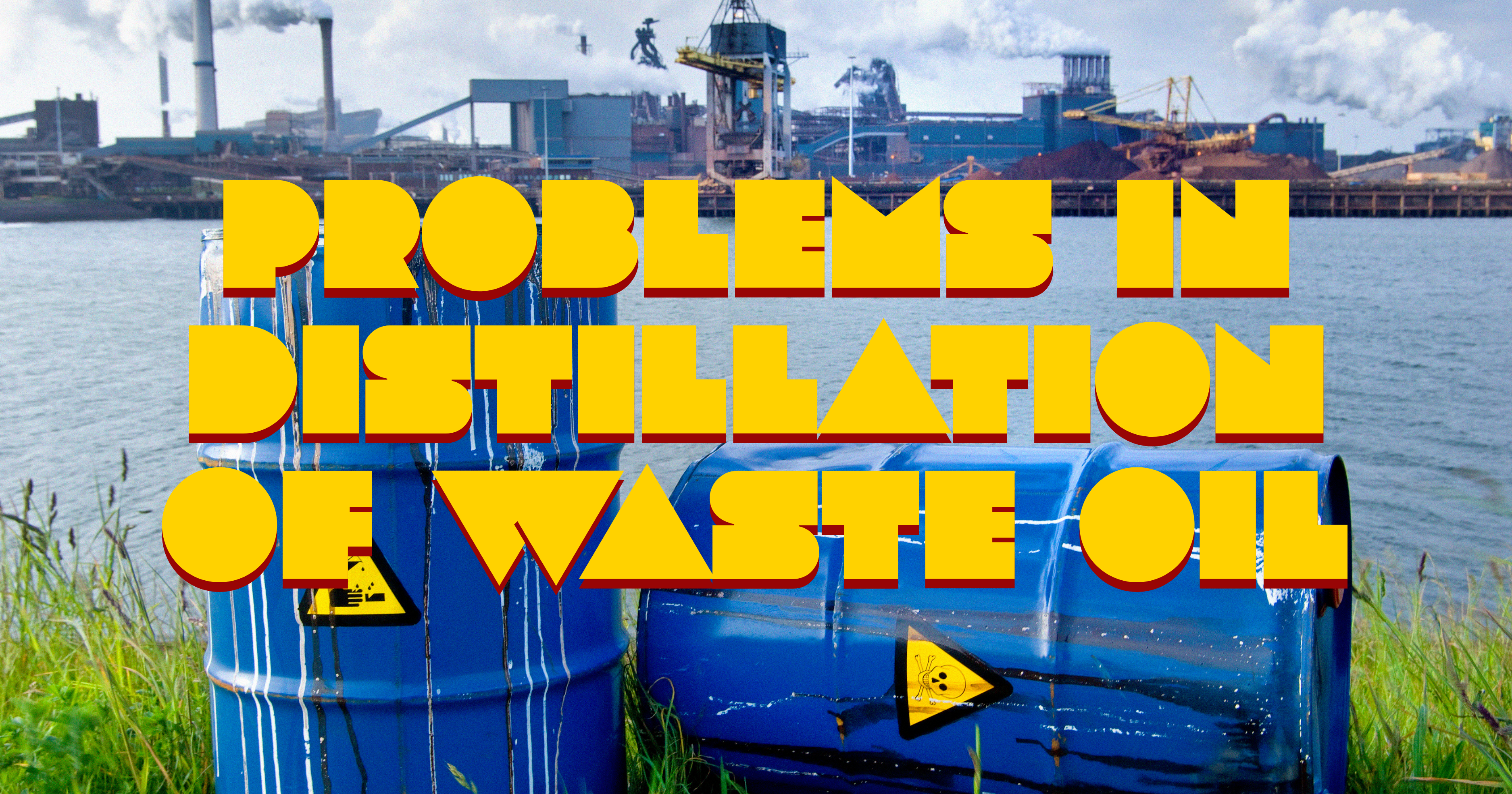In a world where sustainability is the key driver for industrial revolution, Waste Oil Distillation has come to be a game-changing technology that fills the environmental protection and profitable energy generation gap.
Day after day, industries in Chennai, Coimbatore, and across India produce thousands of litres of waste oil — from equipment, engines, and industrial processes. If dumped carelessly, this oil contaminates the ground, atmosphere, and water.
But with the development of Waste Oil Distillation technology, this waste material can now be distilled into top-grade diesel fuel, presenting both environmental and economic benefits.
This blog delves into how Waste Oil Distillation is transforming the field of waste management and enabling industries to convert “waste into wealth” via Waste Oil to Diesel Fuel conversion.
What is Waste Oil Distillation?

Definition
Waste Oil Distillation is a cutting-edge chemical and thermal technology that transforms used lubricants, hydraulic oils, and industrial waste oil into reusable, environmentally-friendly diesel fuel.
The system removes contaminants and recycles hydrocarbons, converting dirty oil into a clean fuel source that operates nearly as well as regular diesel.
This method forms the foundation of Waste Oil to Diesel Fuel technology — a clean, efficient, and economically viable solution for modern industries.
Why Waste Oil Distillation Is Important
In India alone, millions of litres of used oil are thrown away every month, often ending up in landfills or sewage, resulting in severe contamination.
Waste Oil Distillation changes this narrative by:
-
Stemming pollution and preserving natural resources
-
Cutting crude oil imports and reliance
-
Providing industries with an affordable source of fuel
-
Supporting circular economy initiatives
-
Ensuring environmental compliance
Each litre of oil recycled through Waste Oil Distillation means one less litre polluting the earth — and one more litre of clean, usable energy.
How Waste Oil Distillation process

The conversion of Waste Oil into Diesel Fuel involves multiple scientific stages. Here’s a simplified breakdown:
1. Waste Oil Collection
Used oil is collected from:
-
Vehicle service stations and workshops
-
Industrial equipment and manufacturing facilities
-
Power generation plants
-
Marine transport and logistics companies
This waste oil serves as the raw distillate feedstock.
2. Pre-Treatment Process
The collected oil is filtered and de-watered to eliminate contaminants such as:
-
Sludge and sediments
-
Moisture and acids
-
Metal particles and dust
This ensures that the oil is clean enough for the next stage — distillation.
3.Future for Waste Oil Distillation

The purified oil is heated under controlled temperatures in a reactor.
During heating, long hydrocarbon chains break down into lighter fractions such as diesel and kerosene.
This is the core of the Waste Oil Distillation process, beyond where molecular structures are reconfigured to produce clean, usable diesel fuel.
4. Condensation
The vaporized hydrocarbons are cooled and condensed back into a liquid, resulting in a distillate rich in diesel hydrocarbons.
5. Chemical Purification
The condensed oil undergoes chemical treatment to:
-
Remove sulfur and other impurities
-
Neutralize odors
-
Improve color and stability
6. Final Product and Quality Testing
The final product — Waste Oil to Diesel Fuel — undergoes rigorous testing to meet performance and emission standards.
It can be used in:
-
Industrial boilers and furnaces
-
Diesel generators
-
Transportation fleets
-
Heavy machinery
Key Features of Modern Waste Oil Distillation Systems
Innovative System Highlights
State-of-the-art Waste Oil Distillation systems adopted in India feature advanced automation and safety features.
Main Advantages:
-
⚙️ High Conversion Efficiency: Up to 90% oil recovery into diesel
-
🌱 Eco-Friendly Design: Low emissions and zero-waste discharge
-
🧠 Smart Controls: Real-time monitoring of temperature and pressure
-
🔋 Energy-Efficient: Built-in heat recovery systems for low energy use
-
🧩 Modular Scalability: Designed for both small workshops and large-scale plants
-
✅ Regulatory Compliance: Meets national fuel and pollution control standards
These advancements make Waste Oil Distillation a safe, scalable, and profitable energy model for Indian industries.
Top 5 Advantages of Waste Oil Distillation
1. Environmental Sustainability
Improper waste oil disposal contaminates soil and water.
Waste Oil Distillation eliminates this risk by converting pollutants into renewable energy.
Environmental Benefits:
-
Zero-waste discharge
-
Reduced CO₂ and SO₂ emissions
-
Prevention of soil and water pollution
-
Promotion of clean, renewable energy practices
2. Cost Savings and Profitability
The most practical advantage of Waste Oil Distillation is its cost efficiency.
When compared to traditional diesel:
-
Distilled diesel costs 40–60% less to produce
-
Saves money on waste disposal
-
Offers ROI within 12–18 months
-
Makes industries fuel self-reliant
💡 Example:
A textile mill in Coimbatore reduced annual fuel expenses significantly by adopting Waste Oil to Diesel Fuel for its power generators.
3. Strengthening India’s Energy Security
India imports over 80% of its crude oil. By adopting Waste Oil Distillation, industries can:
-
Decrease oil imports
-
Secure domestic fuel supplies
-
Support Atmanirbhar Bharat (Self-Reliant India)
-
Ensure energy stability during international market crises
Each Waste Oil to Diesel Fuel plant contributes directly to India’s path toward sustainable energy independence.
4.Problems in Distillation of Waste Oil

Waste Oil Distillation is a perfect example of the circular economy model — where resources are reused, recycled, and reintroduced into the production cycle.
Circular Economy Benefits:
-
Converts waste into valuable fuel
-
Encourages responsible manufacturing
-
Enhances ESG (Environmental, Social, Governance) ratings
-
Reduces overall industrial carbon footprint
This isn’t just recycling — it’s reshaping the future of industrial sustainability.
5. Creating Local Jobs and Economic Growth
Every new Waste Oil Distillation facility creates opportunities in renewable energy and green technology.
Economic Benefits:
-
Generation of green jobs for engineers and operators
-
Boost to local suppliers and equipment manufacturers
-
Skill development in renewable energy
-
Strengthened rural and urban economies
This sector not only protects the planet but also fuels livelihoods.
Geo Impact: How Waste Oil Distillation Empowers Tamil Nadu
In Chennai
-
Reduces industrial waste oil dumping
-
Provides cost-effective diesel for logistics and port operations
-
Decreases urban air and soil pollution
In Coimbatore
-
Helps textile and engineering industries generate in-house fuel
-
Lowers power generation and transport expenses
-
Encourages sustainable production and energy use
Through Waste Oil Distillation, Tamil Nadu industries are setting a benchmark for eco-friendly and economical growth.
Economic and Environmental Comparison
| Parameter | Traditional Disposal | Waste Oil Distillation |
|---|---|---|
| Environmental Impact | Pollutes soil & water | Zero waste, low emissions |
| Cost per Litre | ₹90–₹100 | ₹45–₹55 |
| Resource Utilization | Discarded | Reused as clean fuel |
| ROI | None | 12–18 months |
| Job Creation | Minimal | Significant |
✅ Result: Waste Oil Distillation = Clean, Cost-Effective, Sustainable Energy.
Why Industries Are Investing in Waste Oil Distillation
Businesses across India are adopting this technology due to its long-term benefits:
-
High operational efficiency
-
Quick ROI
-
Lifespan of 10+ years
-
Simple maintenance
-
Full compliance with CPCB and PCB environmental norms
For both small and large-scale industries, Waste Oil to Diesel Fuel systems represent the future of cost-effective, eco-friendly production.
The Future of Waste Oil Distillation in India
Emerging Trends and Opportunities
The coming decade will see Waste Oil Distillation expanding across sectors — from automotive to power and shipping.
Future Possibilities:
-
Integration with renewable energy sources (solar + biofuel hybrids)
-
Government incentives for waste-to-fuel initiatives
-
Export potential for recycled diesel
-
Use of AI and IoT automation for smarter processing
As India marches toward Net Zero 2070, Waste Oil to Diesel Fuel technology is set to play a vital role in the green industrial revolution.
✅ Conclusion: From Waste to Resource – The Power of Waste Oil Distillation
Waste Oil Distillation is proof that sustainability and profitability can go hand-in-hand.
By converting waste oil to diesel fuel, industries not only save operational costs but also reduce pollution and contribute to a cleaner, more energy-secure nation.
This isn’t just a process — it’s a movement toward a greener, self-reliant, and efficient future.
Frequently Asked Questions (FAQs)
1. What is Waste Oil Distillation?
It’s the process of distilling and purifying used oil to produce clean, reusable diesel fuel.
2. How efficient is Waste Oil Distillation?
Modern systems achieve up to 90% conversion efficiency, depending on oil quality.
3. Is Waste Oil Distillation environmentally safe?
Yes — it’s eco-friendly, low-emission, and zero-waste when properly implemented.
4. What are the main economic benefits?
Industries save 40–60% in fuel costs and reduce waste disposal expenses.
5. Where can this technology be applied?
It’s suitable for factories, logistics fleets, refineries, power plants, and any operation generating waste oil.
